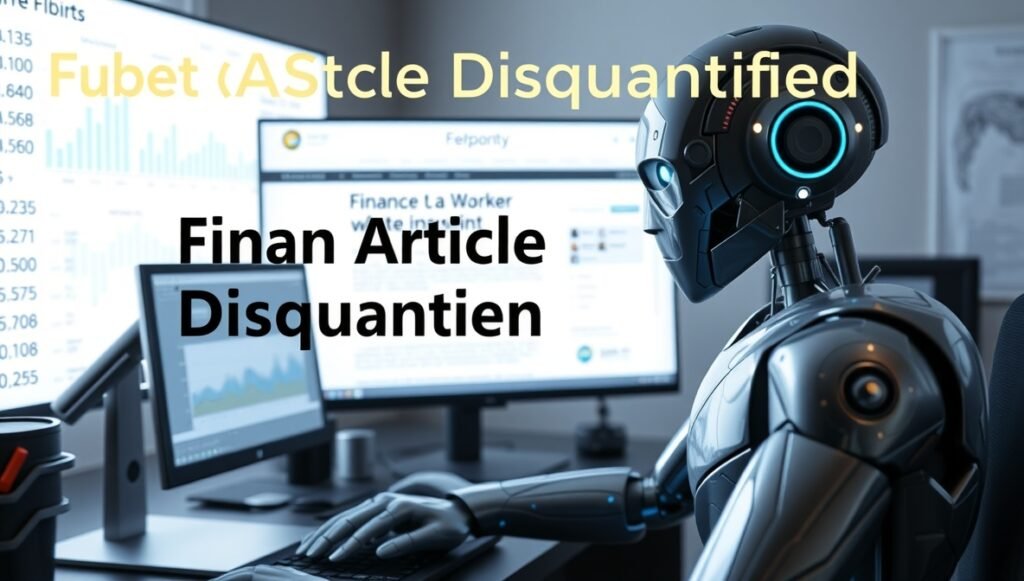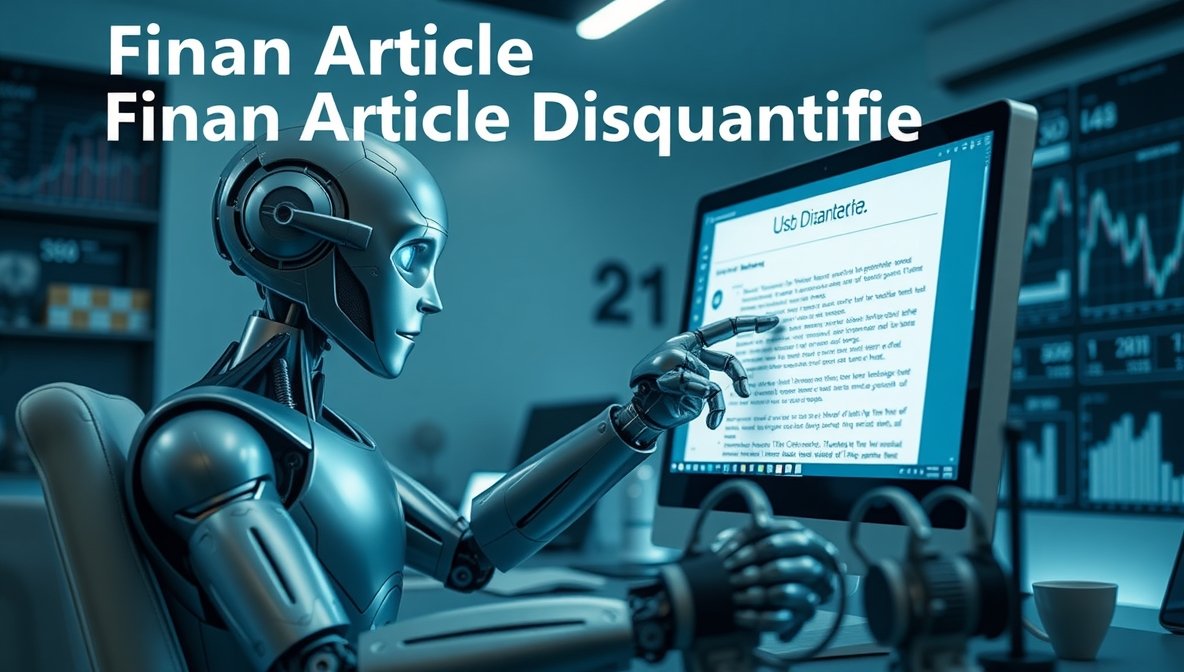Finance article disquantified The financial world is evolving faster than ever before, reshaping how individuals, corporations, and governments interact with money. In an age of digital transformation and global interconnectedness, understanding these changes is not just beneficial—it’s essential. This finance article disquantified explores the intricate relationship between markets, technology, and human behavior, shedding light on how modern finance has become both a science and an art.
The Shifting Nature of Global Finance
The finance industry has always been influenced by major world events—wars, technological revolutions, and political shifts. However, the speed at which global finance evolves today is unprecedented. The 21st century has brought about new mechanisms for investing, saving, and transacting. From decentralized finance to digital currencies, financial ecosystems are no longer restricted to borders or traditional institutions. This finance article disquantified highlights how the globalization of money creates both opportunities and vulnerabilities for individuals and businesses alike.
Globalization has opened countless doors for international trade and collaboration. Yet, it has also magnified risks—market volatility can now spread in seconds across continents. Investors must, therefore, balance risk with innovation, ensuring long-term sustainability in an increasingly uncertain financial climate.
The Rise of Digital Finance
Digital finance has become the cornerstone of modern economies. It has transformed how people make payments, access credit, and invest. Smartphones now serve as digital wallets, allowing seamless transactions and instant access to financial services. The emergence of blockchain technology has further revolutionized finance by introducing transparency and decentralization. In this context, finance article disquantified examines how technology has democratized finance, making it accessible to millions who were previously unbanked.
Cryptocurrencies and blockchain are no longer fringe technologies; they are being integrated into mainstream financial systems. Central banks are exploring digital currencies, and large institutions are incorporating blockchain-based ledgers to improve security and reduce transaction times. As digital finance continues to evolve, education and adaptability will remain key drivers of participation and success.
The Power of Financial Literacy
No matter how sophisticated financial tools become, literacy remains the foundation of success. Individuals who understand personal finance can make informed decisions, manage debt effectively, and build long-term wealth. Finance article disquantified stresses that a financially literate society is a stronger society—one that can withstand economic shocks and foster sustainable growth.
Schools and universities are now incorporating financial education into their curricula. Yet, the challenge remains in ensuring that people from all backgrounds have equal access to financial knowledge. Financial inclusion means not only having access to banking services but also understanding how to use them wisely. theportablegames, hssgamestick, designmode24, convwbfamily, logicalshout, nothing2hide, gamificationsummit
Economic Growth and Sustainability
A healthy economy depends on a balance between growth and sustainability. Rapid economic expansion without environmental or ethical consideration often leads to long-term damage. Finance article disquantified examines the concept of sustainable finance—an approach that integrates environmental, social, and governance (ESG) principles into financial decision-making.
Investors are now demanding transparency and responsibility from corporations. Green bonds, ethical funds, and socially responsible investing have gained traction globally. The financial sector, once seen purely as a profit-driven domain, is now playing a pivotal role in addressing global challenges such as climate change and social inequality.

The Human Element in Finance
Despite advances in automation and artificial intelligence, human intuition remains vital in finance. Market trends are often influenced by emotion, psychology, and collective behavior. Fear and greed can drive bubbles and crashes, reminding us that finance is not solely about numbers but about human choices. Finance article disquantified delves into behavioral finance—a field that studies how psychological factors influence financial decision-making.
Behavioral finance reveals why people make irrational choices, such as panic selling or overinvesting during market booms. Understanding these patterns helps investors develop strategies that mitigate emotional decision-making. This blend of psychology and economics underscores the complexity of modern financial markets. crew disquantified org
The Role of Policy and Regulation
Governments and regulatory bodies play a critical role in maintaining financial stability. Without oversight, markets can easily become exploitative or unstable. Finance article disquantified discusses how effective regulation fosters transparency, protects consumers, and prevents systemic crises. The 2008 global financial crisis was a harsh reminder of what happens when risk management fails and oversight is weak.
In recent years, regulations have evolved to address new threats such as cybercrime and digital fraud. Financial regulators worldwide are now focusing on data protection, ethical AI use, and accountability in automated systems. Balancing innovation with control remains one of the biggest challenges of our time.
Financial Technology and Innovation
Fintech—the fusion of finance and technology—has reshaped everything from lending to insurance. Startups have disrupted traditional institutions by offering faster, cheaper, and more convenient solutions. This finance article disquantified explores how fintech has created opportunities for small businesses and individuals to thrive in competitive markets. befitnatics, shopnaclo, meltingtopgames, fudholyvaz, zixyurevay
Peer-to-peer lending, robo-advisors, and mobile banking are just a few examples of fintech’s transformative power. However, with innovation comes risk. Cybersecurity threats and data breaches are increasing, emphasizing the importance of trust and regulation in the digital economy.
The Future of Work and Financial Independence
Automation and artificial intelligence are redefining the nature of employment. The rise of the gig economy and remote work has shifted how people earn and save. Finance article disquantified highlights the importance of adapting financial planning to this new reality. Traditional pension plans are being replaced by flexible investment portfolios, and digital tools now allow individuals to track and grow their wealth independently.
In Malaysia and other emerging economies, digital banking is bridging the gap between urban and rural populations. Access to mobile banking and digital credit lines is empowering communities to participate in the global economy like never before. These advancements demonstrate how innovation can be inclusive when guided by ethical and practical frameworks. thelaptopadviser, beaconsoft, logicalshout, qzobollrode, embedtree, esoszifediv, drhomey, disfinancified.
The Global Investment Landscape
Investing is no longer reserved for the elite. With the advent of online platforms, anyone can invest with minimal capital. Yet, understanding risk remains crucial. Finance article disquantified examines how the democratization of investing has created both empowerment and new vulnerabilities.
Retail investors now influence markets significantly, as seen in recent events where social media movements impacted stock prices. While this new participation is encouraging, it also reveals how easily markets can be swayed by collective sentiment. Diversification and long-term thinking remain essential for success in this volatile environment.
Inflation, Interest Rates, and Market Cycles
Macroeconomic factors such as inflation and interest rates continue to shape the financial landscape. Rising inflation erodes purchasing power, while fluctuating interest rates influence borrowing and investment patterns. Finance article disquantified analyzes how these factors interconnect and affect both businesses and consumers.
Understanding market cycles helps investors anticipate changes and adjust their strategies accordingly. Economic downturns are inevitable, but they also present opportunities for those who plan wisely. A balanced portfolio and disciplined approach can turn market uncertainty into long-term gain.
Corporate Responsibility and Transparency
Transparency has become a non-negotiable principle in modern finance. Corporations are increasingly held accountable by investors, regulators, and the public. Finance article disquantified underscores that accountability builds trust—a cornerstone of any thriving economy. programgeeks, simcookie, endbugflow, songoftruth, buzzardcoding, decoradtech, kdadesignology, kdadesignology.
Corporate scandals, data leaks, and unethical practices have eroded public confidence in several industries. As a result, transparency and ethics are no longer optional—they are integral to sustainable growth. Companies that prioritize honesty and integrity often outperform their competitors in the long run.
Globalization and Financial Interdependence
The interconnectedness of global markets means that events in one part of the world can have ripple effects everywhere. Supply chain disruptions, geopolitical conflicts, and economic sanctions can quickly impact global trade and investment. Finance article disquantified emphasizes that interdependence requires resilience. Diversification and collaboration between nations can mitigate risks and create shared prosperity.
International cooperation through organizations like the IMF and World Bank continues to shape the future of global finance. However, nations must balance self-interest with global responsibility to ensure stability and fairness in economic systems.
The Psychology of Wealth
Wealth is more than accumulation—it’s about security, freedom, and purpose. Understanding one’s relationship with money is crucial for achieving balance and fulfillment. Finance article disquantified explores how attitudes toward money influence financial behavior. Some individuals view money as a tool for freedom, while others see it as a measure of success.
Mindful financial management encourages individuals to align their spending with their values. This conscious approach not only improves personal well-being but also contributes to more ethical economic systems.
Emerging Trends in Global Finance
Several trends are shaping the future of finance. Artificial intelligence, sustainable investing, and decentralized systems are driving innovation. Finance article disquantified predicts that the next decade will witness even deeper integration between technology and finance.
AI will play an increasing role in data analysis, fraud detection, and customer service. Meanwhile, blockchain will enhance transparency and reduce operational inefficiencies. As these technologies mature, ethical considerations will become even more critical to ensure fairness and accountability.
Personal Finance in the Digital Age
Managing money in the digital era requires both discipline and adaptability. Online platforms have simplified budgeting, investing, and saving, but they also introduce distractions and risks. Finance article disquantified highlights that while convenience has increased, so has the potential for overspending and impulsive behavior.
Financial well-being now depends on smart use of technology. Automated savings, budgeting apps, and investment tools can help individuals achieve goals efficiently. Yet, the foundation remains timeless: spend less than you earn, save consistently, and invest wisely.
Building a Resilient Financial Future
Resilience is the ability to withstand and recover from economic challenges. It requires planning, diversification, and emotional stability. Finance article disquantified concludes that building financial resilience involves more than just accumulating assets—it’s about creating systems that adapt to change.
Global economies face constant challenges—from pandemics to inflationary pressures. Those who prepare, stay informed, and act strategically will not only survive but thrive. Resilient financial systems are built on trust, innovation, and collective responsibility.

Conclusion
The world of finance is a dynamic ecosystem where innovation meets responsibility. As technology transforms the way we think about money, the fundamentals remain the same: knowledge, discipline, and ethics are the cornerstones of financial success. Finance article disquantified reminds us that understanding these principles is more important than ever in navigating a rapidly changing world.
From personal budgeting to global economic policy, finance touches every aspect of life. Those who embrace learning, adaptability, and transparency will shape the financial future—one that balances progress with purpose, innovation with integrity, and growth with sustainability.



